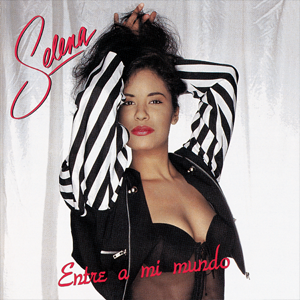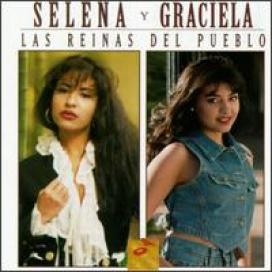
Amor Prohibido is the fourth studio album by American singer Selena, released on March 22, 1994, by EMI Latin. Having reached a core fan base, the label aimed to broaden her appeal with the next studio release. Finding it challenging to write a follow-up hit after "Como la Flor" (1992), Selena's brother A. B. Quintanilla enlisted the assistance from band members Ricky Vela and Pete Astudillo with writing the album's songs. The resulting album has a more mature sound featuring experimental production that blends diverse musical styles from ranchera to hip-hop music. Amor Prohibido is a Tejano cumbia album modernized with a synthesizer-rich delivery using a minimalist style that was quintessential in early 1990s Tejano music.

Entre a Mi Mundo is the third studio album by American singer Selena, released on May 6, 1992, by EMI Latin. The label endeavored to bolster Selena's popularity within the Latin music market in the United States with this release. Selena's brother, A. B. Quintanilla kept his role as the singer's producer and, in collaboration with Selena y Los Dinos members Pete Astudillo and Ricky Vela, composed tracks for the album. The ensuing recording encompassed an eclectic array of songs, attributable to the members' diverse backgrounds, which facilitated the modernization of the many genres they explored. Entre a Mi Mundo is a Tejano cumbia album that encapsulated Selena's quintessential sound, characterized by engaging tunes harmonized with her distinctive, plaintive vocals and a relaxed, danceable cumbia beat. The album incorporates musical inspirations from power pop, R&B, disco, rock, funk, and synthesized Tejano music.

Selena is the debut studio album by American Tejano singer Selena, released on October 17, 1989, by EMI Latin. Its music incorporates a range of contemporary genres with a mix of cumbia and regional styles of Mexican music. The album was released following company president Jose Behar's failed crossover request for the singer. The project was denied by the heads of EMI Records' pop division, believing the singer should first strengthen her fanbase. Selena's brother and principal record producer and songwriter, A.B. Quintanilla III fought to remain the singer's producer. The band introduced Pete Astudillo and Joe Ojeda, who contributed to the album's experimental production and songwriting. Aside from A.B., Selena worked with two Mexican songwriters, Alejandro Montealegre and Reinaldo Ornelas.

Live! or Selena Live! is a live album by American Tejano pop singer Selena, which was released on May 4, 1993, by EMI Latin. The album was re-released on September 22, 2002, as being part of the Selena: 20 Years of Music collection; which included spoken liner notes by her family, friends and her former band members Selena y Los Dinos. Live! includes three cumbia-influenced studio tracks, while the rest of the album consists of live versions of previously released songs. The album was recorded during a free concert at the Memorial Coliseum in Corpus Christi, Texas, on February 7, 1993. It was certified gold by the Recording Industry Association of America in its first year, double platinum in 1995, and 8× platinum in 2017.

American singer Selena released eleven studio albums, three live albums, three boxsets, three remix albums, two soundtrack albums, and twenty compilation albums. Credited for elevating a music genre into the mainstream market, Selena remains the best-selling Tejano recording artist in history, selling over 18 million records worldwide. She was named the top-selling Latin artist of the 1990s decade in the US by Billboard magazine.

Mis Mejores Canciones – 17 Super Éxitos is a greatest hits album by American singer Selena released on September 17, 1993, through EMI Latin. Beginning in January 1993, the label released a comprehensive collection that spotlighted its Latin music artists as part of its Latin Classics series. Mis Mejores Canciones – 17 Super Exitos encompasses 17 tracks, ranging from songs recorded on her debut album with EMI Latin, to songs present in Entre a Mi Mundo (1992). The album received a positive response from music critics who enjoyed the label's catalog releases and praised the tracks on the album for showcasing Selena's early popular recordings. Following the shooting death of Selena on March 31, 1995, Mis Mejores Canciones – 17 Super Exitos debuted at number one on the US Billboard Top Catalog Albums chart, the first Spanish-language recording to do so. The Recording Industry Association of America (RIAA) certified the album diamond (Latin), denoting 600,000 units shipped in the United States.

Siempre Selena is the second posthumously released album by American singer Selena, released by EMI Latin on October 29, 1996. The album contained mostly unreleased recordings and remixes of previously released content. Songs on the album range from a 14-year-old Selena on "Soy Amiga" (1986) to the shelved Don Juan DeMarco (1995) soundtrack song "Siempre Hace Frio". Siempre Selena was a result of the impact of Selena's death in March 1995, where the singer's father and manager Abraham Quintanilla Jr. began receiving requests from fans of her music. Abraham rediscovered forgotten tapes of songs Selena recorded for various projects. Following her death, Abraham expressed how he wanted to keep the singer's legacy alive and that public knowledge of Selena was very important to him. Critical reception of Siempre Selena was mixed, with varying reviews suggesting that the album was more for Selena's fan base and found no particular track on the album to be of any interest, while others favored its diversity and remastered songs.

All My Hits: Todos Mis Éxitos Vol. 2 is a greatest hits album by American singer Selena that was released on February 29, 2000, through EMI Latin. After Selena's murder in 1995, her father Abraham Quintanilla stated his commitment to preserving her music and EMI Latin pledged ongoing support for her releases. In 1999, the label's president José Behar acknowledged Selena, who remained the label's top-selling artist, for her contributions to establishing EMI Latin as "the house that Selena built". In March 1999, to commemorate the label's tenth anniversary, it released All My Hits: Todos Mis Éxitos; it achieved commercial success and a sequel was announced. All My Hits: Todos Mis Éxitos Vol. 2 contains 16 songs ranging from tracks featured on Selena's Muñequito de Trapo (1987) to the posthumous 1997 club remix of "Enamorada de Ti" (1990).

"No Me Queda Más" is a song by American singer Selena on her fourth studio album, Amor Prohibido. It was released as the third single from the album in October 1994 by EMI Latin. "No Me Queda Más" was written by Ricky Vela, and production was handled by Selena's brother A.B. Quintanilla. A downtempo mariachi and pop ballad, "No Me Queda Más" portrays the ranchera storyline of a woman in agony after the end of a relationship. Its lyrics express an unrequited love, the singer wishing the best for her former lover and his new partner.

Pedro Astudillo, is an American singer-songwriter, record producer, and dancer. Referred to as "the Latino Babyface" by The Daily Journal, he is regarded as the architect behind Selena's sound, as he collaborated or coauthored the singer's top-selling and most popular recordings that cemented him into music history. Astudillo wrote or collaborated on some of the most popular Tejano music songs of the 1990s and was inducted into the Tejano Roots Hall of Fame in 2019. His impact on the United States Latin music scene lies in his role as a songwriter collaborator, according to Billboard magazine.

"Techno Cumbia" is a song recorded by American singer Selena for her fourth studio album, Amor Prohibido (1994). It was posthumously released as the b-side track to "Dreaming of You" through EMI Latin on August 14, 1995. Techno Cumbia would be put on her fifth and final studio album Dreaming of You (1995) and would be the fourth single for Dreaming Of You. "Techno Cumbia" was written by Pete Astudillo and co-written and produced by Selena's brother-producer A.B. Quintanilla. The song is a dance-pop and tecnocumbia recording with influences of dancehall, rap, Latin dance, and club music. Lyrically, Selena calls on people to dance her new style the "techno cumbia" and calls out those who cannot dance.

"Amor Prohibido" is the title song of American Tejano singer Selena's fourth studio album of the same name (1994). Released as the lead single through EMI Latin on April 13, 1994, it was written by Selena, her brother and music producer A.B. Quintanilla III, and her band's backup vocalist Pete Astudillo. A popular interpretation compares it to Romeo and Juliet.
Gary Lee Hobbs is an American singer-songwriter, record producer, and actor. Called "Tejano music's Vince Gill", he has been widely recognized for his resonant baritone vocals, characterized by their emotive quality, and is considered a pioneer within the genre. Hobbs played a significant role in the expansion of Tejano music during the 1990s and became one of the most popular Tejano singers of the 1980s and 1990s.

Las Reinas del Pueblo is a compilation album by American Tejano music singer Selena and Mexican banda singer Graciela Beltrán. It was released on April 4, 1995, by EMI Latin in the wake of Selena's death on March 31, 1995. The decision to produce a compilation album featuring Beltrán emerged after her tribute to the singer at a Houston memorial. The title was inspired by Mexican newspapers that referred to Selena as "an artist of the people" during a 1992 press tour in the nation and subsequently dubbed her "La Reina del Pueblo" in the aftermath of her death. Las Reinas del Pueblo encompasses six tracks by Selena and six by Beltrán, encapsulating their respective tenures with EMI Latin. Las Reinas del Pueblo peaked at number four on the US Billboard Top Latin Albums and Regional Mexican Albums chart, both behind other Selena releases. The recording peaked at number 147 on the American Billboard 200 chart. The album peaked at number ten on the Spanish albums chart in 2010. Beltrán's participation in the album yielded substantial promotional and sales enhancements.

Latin music is a term used by the music industry as a catch-all category for various styles of music from Ibero-America, which encompasses Latin America, Spain, Portugal, and the Latino population in Canada and the United States, as well as music that is sung in either Spanish and/or Portuguese. It may also include music from other territories where Spanish- and Portuguese-language music is made.
This is a list of notable events in Latin music that took place in 1995.

Desvelado is the debut studio album by American Tejano singer Bobby Pulido. The album charted in the top 10 of the US Top Latin Albums chart and sold over 100,000 copies in the US. It is also known for its title track, which became its third single and was written by Jorge Amena.
José Roberto Pulido, known as Roberto "El Primo" Pulido, is an American musician whose career spans five decades. Pulido has been recognized as a Tejano music pioneer for his introduction of the accordion and saxophone into his music which "helped bridged the traditional conjunto and the modern Tejano camps" in the mid-1970s. Pulido is the father of Tejano musicians Alma Pulido and Bobby Pulido.

Freddie Records is an American independent record label founded in Corpus Christi, Texas on November 1, 1969, by musician Freddie Martinez. Originally functioning as a recording studio and distributor for Martinez, the label expanded its roster to include other Tejano musicians to avoid financial failure. The label commenced producing albums for an array of artists, including Ramón Ayala, Agustin Ramirez, Oscar Martinez, and Joe Bravo. Ayala became the best-selling act of the label, sustaining the financial stability of Freddie Records throughout the 1970s and 1980s. The label sponsored a Little Joe concert in 1978 and recorded it for their Live for Schlitz album. It led to a ban on future events in the area, though the album remained a lucrative live recording for Freddie Records for two decades. As Tejano music's popularity surged, Freddie Records augmented its foundation by incorporating an additional 6,000 square feet for a second studio and production facility replete with updated MCI equipment capable of accommodating cassette tape and 8-track formats and instigated a release schedule of two albums per month on average.
La Diferenzia is an American Tejano music septet group based in San Antonio, Texas. Led by Mexican singer-songwriter Ricardo Castillon, its members included Mexican songwriter Miguel Spindola, saxophonist and keyboardist Raul Arnold, bajo sexto player Omar Cardenas, accordionist Simon Arausa, guitarist Jesse Moya, and Jose Luis Benavides on the drums. The group chose "Diferenzia" to stand out from other Tejano bands and wanted to offer a variety of musical styles. Castillon wanted to provide listeners with Tejano, mariachi, merengue, cumbia, and ballads. Ricardo and his brother, Ramiro Castillon, started La Diferenzia, recording under Manny Guerra's label in the late 1980s. Following Ramiro's death during a car accident in 1991, the group disbanded.

















